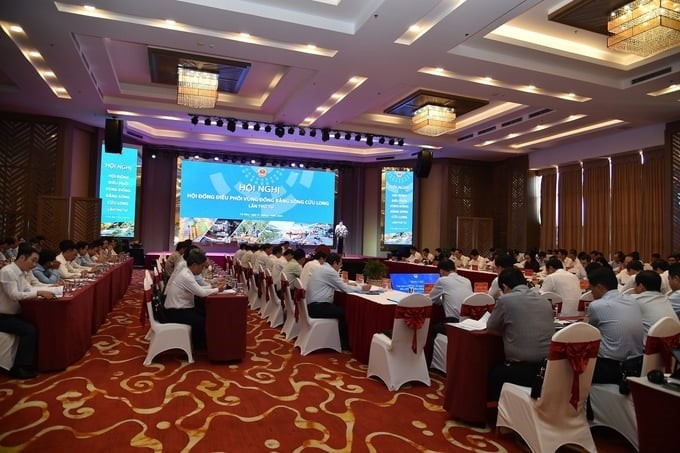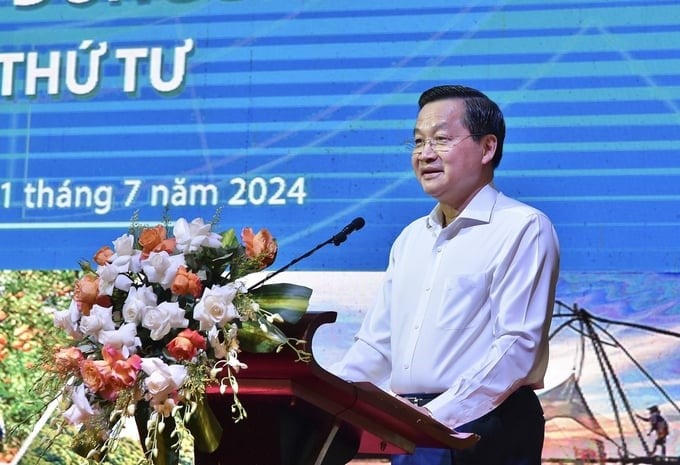May 28, 2025 | 15:05 GMT +7
May 28, 2025 | 15:05 GMT +7
Hotline: 0913.378.918
May 28, 2025 | 15:05 GMT +7
Hotline: 0913.378.918

Deputy Prime Minister Le Minh Khai, Chairman of the Coordinating Council for Mekong Delta Region, chaired the conference. Photo: Tran Manh.
On July 1, Deputy Prime Minister Le Minh Khai, Chairman of the Coordinating Council for Mekong Delta Region, chaired the Conference of the Coordinating Council for Mekong Delta Region.
On the basis of stating the existing problems and difficulties, especially facing the impact of climate change, particularly on water security, the Regional Council recommends that there should be mechanisms and policies for the field of clean water and domestic water to serve people. At the same time, support difficult areas with scarce clean water sources and have mechanisms to support research and investment in large-scale reservoir systems (about 30 hectares/reservoir) to store backup fresh water sources.
Promulgate policies to develop agriculture, forestry, and fisheries, including special incentives for rice growers to stabilize the whole country's major food production areas; and policies on temporary rice storage to support farmers in linking production chains and improving the quality and added value of agricultural products to develop a nature-based and sustainable agricultural economy. Localities in the region are allowed to flexibly convert the planned area of ineffective rice-growing land to land for growing crops, fruits, etc., with the norm in the Mekong Delta region being at least 30% higher than the national average.
It is necessary to have specific mechanisms and policies to attract appropriate investment to overcome river and coastal erosion, limit the impact of climate change, protect and develop forests, and ensure social security for people in coastal areas.
Discussing some more difficulties in the Ca Mau peninsula sub-region, Mr. Huynh Quoc Viet, Chairman of the Ca Mau Provincial People's Committee, said that the Ca Mau peninsula is affected by climate change, sea level rise, river and coastal erosion occurring faster and faster, and encounters difficulties with fresh water sources.
From the above-mentioned difficulties and problems, the Chairman of the Ca Mau Provincial People's Committee proposed that Ministries and Central branches support the province with about VND 197 billion to overcome landslides and land subsidence and VND 1,300 billion to overcome East coastal erosion, with a length of about 21 km. Support VND 684 billion to fix 5.7 km of extremely dangerous river banks that are eroding. Regarding fresh water solutions for the Ca Mau peninsula area, the province also suggested that the Ministry of Agriculture and Rural Development direct the early construction and completion of the system.
In Kien Giang, Mr. Lam Minh Thanh, Chairman of the Provincial People's Committee, mentioned some of the effectiveness of the Cai Be-Cai Lon irrigation structure, with a total investment of more than VND 3,300 billion in coordinating fresh water storage and salinity control, especially changing thinking and production practices in a nature-based, proactive, and adaptive spirit. Mr. Thanh also stated some difficulties and challenges regarding the phenomenon of coastal erosion that has been occurring more frequently and more seriously.
Kien Giang province has about 122/200km of eroded coastline, of which 82/122km have been invested; the remaining 39km have not been fully invested in the entire route, seriously affecting tens of thousands of hectares of production in coastal protection forests and the safety of coastal residential areas. From there, Kien Giang province proposed that the Government continue to support funding for the construction of the landslide embankment with an investment of more than VND 500 billion and soon invest in repairing Tac Thu Lock (Ca Mau) to control salt water in the East Sea.

Deputy Prime Minister Le Minh Khai at the Conference of the Coordinating Council for Mekong Delta Region. Photo: Tran Manh.
After listening to reports and opinions of Ministries, branches, and localities, Deputy Prime Minister Le Minh Khai assessed: The economic growth rate of the Mekong Delta in 2023 reached 6.37%, the 2nd highest in 6 regions across the country. Per capita income increased 1.6 times compared to 2020, reaching VND 72.3 million/person/year.
A number of important and key projects have been completed and put into use, such as the My Thuan-Can Tho expressway and the My Thuan 2 Bridge. Many important works and projects in the fields of transportation, irrigation, energy, tourism, and agricultural development support are in the process of being implemented or researched and completing investment preparation procedures.
However, according to the Deputy Prime Minister, the Mekong Delta still has shortcomings, limitations, difficulties, and challenges. Specifically, the region's economic growth is quite good but not really sustainable, and the scale is still very modest (accounting for only 12% of the country's GDP). Economic growth in some localities is still slow, and economic restructuring has not met requirements.
Besides, the socio-economic infrastructure of the Mekong Delta region is still weak, lacking resources for investment. Regional linkage activities are not effective. Some association agreements are still formal and not intrinsic. The application of science and technology is still slow.
To develop the Mekong Delta in the coming time, Deputy Prime Minister Le Minh Khai stated clearly that Ministries and localities need to gradually concretize new thinking and a new vision in the country's socio-economic development strategy for the 2021–2030 period and the orientations and directions of the Party and the State. Thereby, opening up new development opportunities and shaping values for the entire region, promoting the distinct potential, outstanding opportunities, and existing competitive advantages of fields, areas, and localities, and removing and resolving limitations, weaknesses, conflicts, challenges, and difficulties.
"Water security is an urgent issue that requires proactive solutions through structural and non-structural solutions adapting to climate change, as the drought situation in recent times has had a major impact on all aspects of people's lives and production, especially in the Mekong Delta provinces. This will affect food security and the development progress of the Mekong Delta in the long run," Deputy Prime Minister Le Minh Khai emphasized.
Translated by Thu Huyen

(VAN) The mutual export of agrifood products between the European Union (EU) and the United Kingdom (UK) must occur again without certification, border controls or other red tape. This was agreed at the UK-EU summit.
/2025/05/22/5121-2-173645_677.jpg)
(VAN) NBSAP Tracker identifies strengths and areas for improvement in the National Biodiversity Strategy, based on each region’s priorities and capacities.

(VAN) The draft amendment to the Circular on rice export trading stipulates a periodic reporting regime for rice exporting enterprises.

(VAN) Dong Thap farmers attained an average profit margin of 64% during the summer-autumn 2024 crop (first season), while An Giang and Kien Giang farmers followed with 56% and 54%, respectively.

(VAN) As a doctoral student doing research on renewable energy and electrification at Harvard University, the author shares his musings on electricity, nature, and countryside memories.

(VAN) The decree on Extended Producer Responsibility (EPR) ensures transparent management and disbursement of support funds, avoiding the creation of a “give-and-take” mechanism.

(VAN) Hue City rigorously enforces regulations regarding marine fishing and resource exploitation, with a particular emphasis on the monitoring of fishing vessels to prevent illegal, unreported, and unregulated (IUU) fishing.